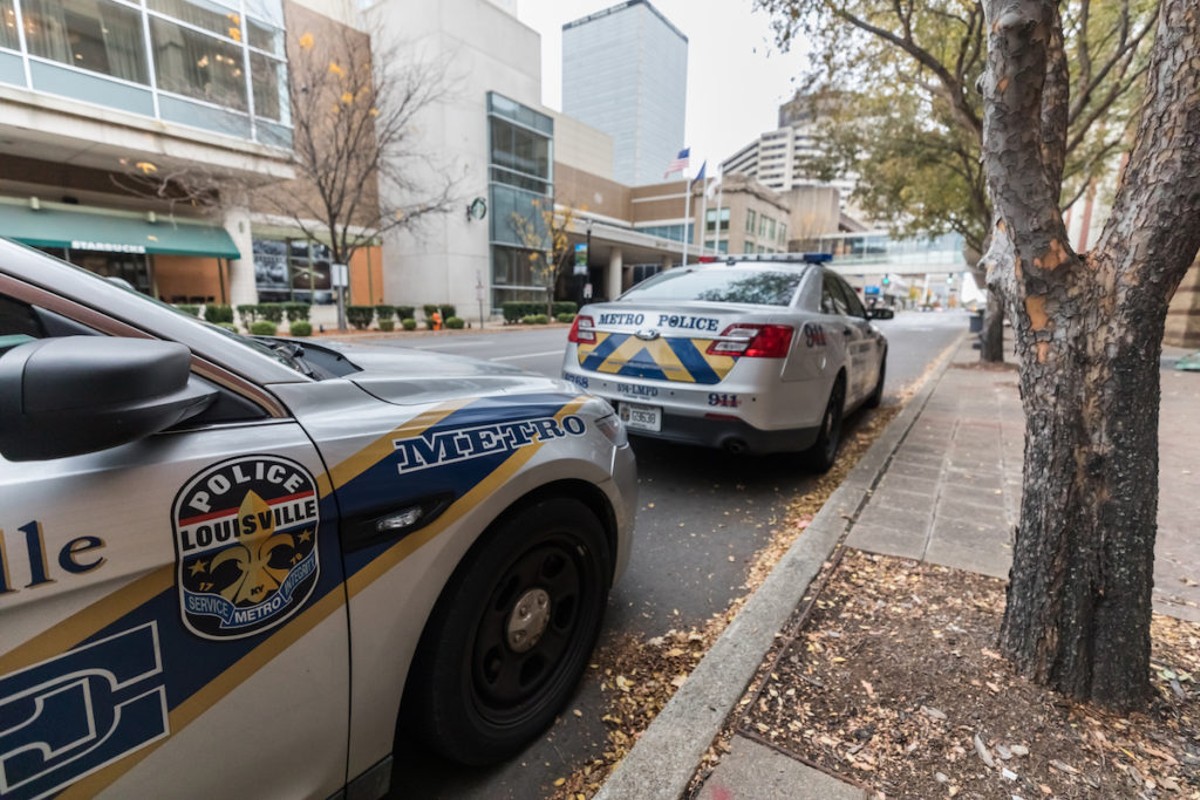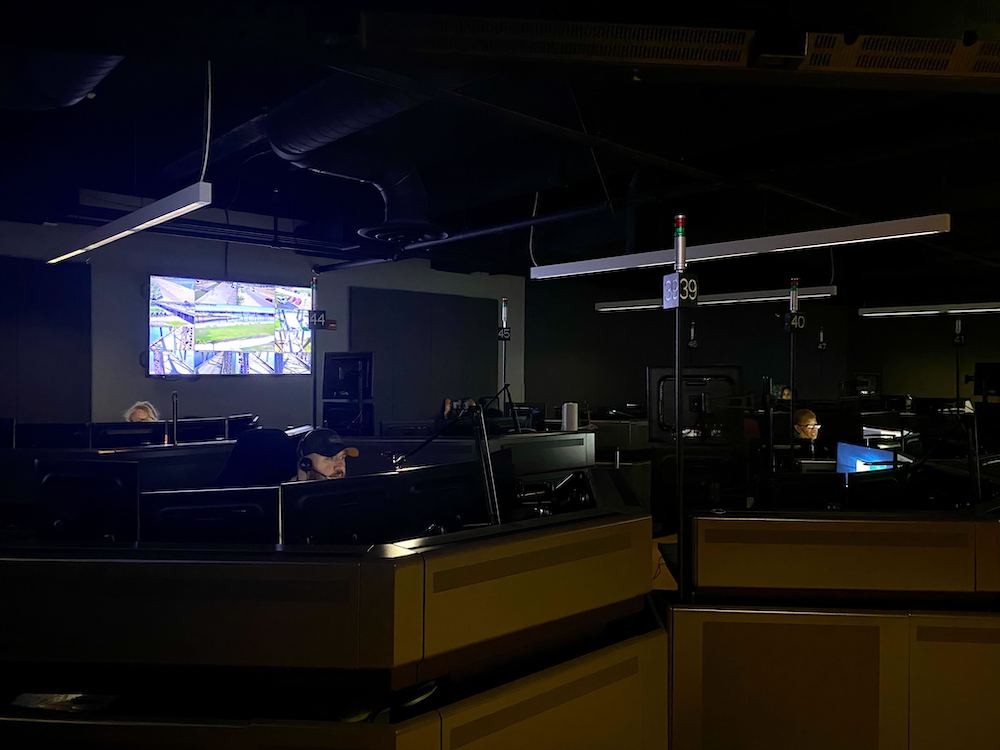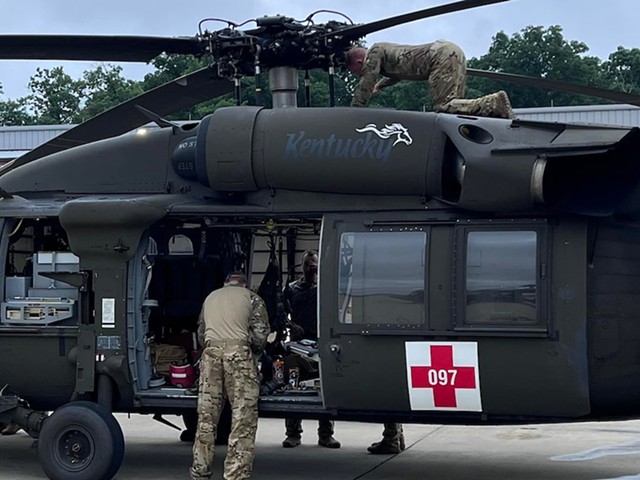When plans got underway to introduce a non-police response to some behavioral health-related 911 calls, Louisville Metro Emergency Services Deputy Director Kelly Jones didn’t love the idea.
As a former cop who spent three decades on Louisville’s police force before joining Emergency Services, the thought of sending unarmed civilians into unpredictable environments struck him as reckless and dangerous. In Jones’ telling, he put his “foot down and [his] mouth open” and told representatives of Seven Counties Services — the company hired by the city to staff the program — that he would not take responsibility for civilian responders getting killed, so they better find a way to operate safely.
“I was adamant about that. Probably not so nice about that. Because I didn’t want anybody hurt — including the person that needs the services,” he said. “It took one of them to finally tell me one day: ‘Look Kelly, our people are willing to accept those risks when they go into the field. Get over that. We’re willing. You’re not putting us in that position. You’re not making us. We’re not a last resort. We’re willing to take the risk, just like you did when you were a cop.’”
Today, Jones is a strong supporter of the diversion program, which began operations in March after a year and a half of planning and study.
The program, which can see unarmed civilian crisis interventionists respond to some behavioral health crises instead of police officers, was the most ambitious community-related policing reform included in the September 2020 settlement between the city and the family of Breonna Taylor, the 26-year-old Black ER tech who was killed by police in her apartment more than two years ago.
Diversion programs in Louisville and elsewhere across the country operate on a simple premise: Police are not always the best choice to respond to certain emergency calls, nor are they equipped to do so. As communities across the nation sought ways to “reimagine” policing and reduce contacts between the general public and armed police officers amid 2020’s racial justice protests, diversion programs were frequently brought up as a reform that could do that.
While diversion programs reduce contact between police and members of the public, the leaders of Louisville’s diversion efforts say their program also frees up 911 dispatchers as well as police officers to better do their jobs at a time when the department continues to struggle with low staffing levels.
AN OPTION BEYOND JAIL OR THE HOSPITAL
Under Louisville’s diversion program, people experiencing a behavioral health crisis, or who are with people who are experiencing such a crisis, can see their 911 calls diverted to a trained “crisis triage worker” at downtown’s MetroSafe building. If their crisis cannot be resolved over the phone, a mobile response team is dispatched to that person’s location. A mobile response team can also be requested by LMPD officers who deem their presence appropriate.“Essentially their focus is to figure out what's going on with that person and help de-escalate them through their crisis, whatever that looks like for them,” said Nicole Wiseman, deflection project coordinator with Seven Counties Services.
The program is currently operational between 2 p.m. and 10 p.m. daily for callers in LMPD’s 1st and 4th Divisions. The 1st Division covers downtown and Phoenix Hill as well as the West End’s Russell and Portland neighborhoods. LMPD’s 4th Division covers South Louisville, Old Louisville, Shelby Park, Smoketown, Germantown, Schnitzelburg and several other neighborhoods. Those behind the program hope to expand it to a 24/7, city-wide operation as soon as possible, but have been struggling with staffing (Seven Counties is currently advertising for multiple 911 deflection jobs on its website).
Through June, the program received 261 “unduplicated” calls according to Seven Counties Services, which noted that they received “a lot more” repeat calls. According to Emergency Services, there were more than 630 calls to 911 through June that would have qualified for the deflection program, but were received outside of its working hours or originated in areas of the city not yet covered by the program.
Most diversion calls get resolved on the phone, with the mobile response team being dispatched on 75 occasions, according to Seven Counties Services.
While police have few options for intervention mental health calls — pretty much the hospital or jail — mobile responders have the ability to connect people experiencing a crisis with services that they need by putting them in touch with resources or even giving them a ride. They also have the ability to bring them to a “respite center” at a Seven Counties facility where they can stay for 24 hours.
“What that looks like is a place that they're able to go for up to 24 hours and just be safe and stable, to take them out of whatever situation that they're in so they have a little extra support,” said Wiseman. “So, it’s not to the extent of hospitalization, because for many folks, that’s not what they need. But they need a little more support than what they have at that particular moment.”
The respite center differs from the Living Room, a similar space that ceased operations due to budget cuts in 2019, in that it requires a referral from the 911 diversion program, meaning police can’t drop people off there nor can people show up there without a referral.
Mobile responders can also give a person in crisis a ride to a service, or even a friend's house.
“Sometimes that transportation might be to a family or friend’s house because that’s someone who's a natural support to them,” said Jean Romano, vice president of adult services at Seven Counties. “We want to increase their use of natural supports so they’re not relying on 911 as their ‘I need help.’”
Calls where an individual is in physical possession of a weapon, is under the influence of drugs or alcohol “to the extent requiring medical intervention,” is in the process of or threatening to hurt or kill someone, requires medical attention or is known to be potentially violent do not qualify for diversion and will still be routed to police.
However, Meiman, the Emergency Services executive director said it is a case by case basis at times: For instance, he said, if somebody said they were going to get a gun in their house and kill themselves, that would likely result in a police response whereas if somebody threatened suicide with pills, that might only see the crisis response team show up.
Crisis responders have the ability to summon law enforcement if they feel the need and can also opt out of any situation they feel is unsafe.
STOPPING REPEAT CALLS, FREEING UP POLICE
Those overseeing the 911 deflection program say it also frees up 911 operators and police officers.“A lot of people don’t realize that we have some callers that sometimes call [911] 200 to 300 times before lunch,” said Jones. “And that takes away from people who really need 911 services. Because if [repeat callers] call and hang up, they have a policy, they have to be called back.”
Often, people call 911 when they feel there is nobody else to help them, even if their reason for calling does not rise to the level of what might traditionally considered an emergency. The diversion program allows for those people to speak to somebody who is able to listen and connect them with services they could benefit from, going beyond what a 911 dispatcher can offer.
Meiman, the Emergency Services Executive Director, recalled a “success story” where a person who used to call “several hundred times a day” was routed to a crisis triage worker who found out the caller had been without their medication and needed to be connected with services to help them get their medication.
Another success story Meiman recalled was when officers were able to call mobile responders to a behavioral health crisis — freeing the officers to respond to a robbery blocks away when the mobile responders took over.
“For a lot of those folks, we found out they really just need to talk to somebody,” said Wiseman. “And they may have not had that outlet for whatever reason before. Perhaps they didn’t know about crisis hotlines, or they didn’t have that natural support in their family.”
Police responding to behavioral health crisis calls often have no good options, with jail and the hospital being the places they can bring somebody in a mental health crisis.
“Having us be able to engage and interrupt that cycle has been helpful,” said Romano, the Seven Counties Services adult services vice president. “I’ve had multiple officers call me and say ‘Hey, what about this one? Is this one that we can do?’ So I know they’re thinking about it.”
And sometimes, the presence of police on those kinds of runs can have potentially deadly consequences — just see headlines like “13-Year-Old Boy With Autism Disorder Shot By Salt Lake City Police” or the chilling statistic from a Washington Post investigation that found police officers killed the person they were called to help 178 times between 2019 and 2021.
A SERVICE FOR THOSE WARY OF CALLING THE POLICE
Growing up in Louisville’s mostly-Black West End, an area of the city where residents have complained about the deleterious effects of over-policing for decades, mobile crisis responder Curtis Sears saw firsthand how many people were reluctant to call the police when they were in trouble.“They felt like if they called the police, with that individual having those mental health meltdowns or whatever, that it wouldn’t turn out so good if the police came out,” said Sears.
When Sears saw plans for the 911 deflection program on the news, he thought it was something he'd love to be a part of. He had previously been with the Department of Juvenile Justice for nearly three decades, where he worked with minors caught up in the justice system, many of whom had mental health issues.
As a program supervisor with Louisville's deflection program, Sears gets dispatched to behavioral health crises that cannot be handled over the phone. Responders like Sears work in pairs, riding in a plain white van and wearing civilian clothes, hoping to free callers of the stigma that might come with blue police lights, sirens and uniformed officers outside of their home.
Sears feels the fact that they are civilians helps people in crisis open up and get the assistance they need.
“I think people are more open to us sometimes because they see us as mental health specialists and what they're experiencing is a mental health crisis,” he said. “It’s almost like saying you wouldn’t go to a hamburger joint to get a fish sandwich.”
Sears is optimistic that the program will help people access behavioral health services they need — particularly in communities where people are hesitant to have contact with police.
“This program will help a lot of people a lot, because a lot of people who would generally not be getting help will get it now,” he said.
Keep Louisville interesting and support LEO Weekly by subscribing to our newsletter here. In return, you’ll receive news with an edge and the latest on where to eat, drink and hang out in Derby City.
Follow us on Facebook, Twitter and Instagram.







